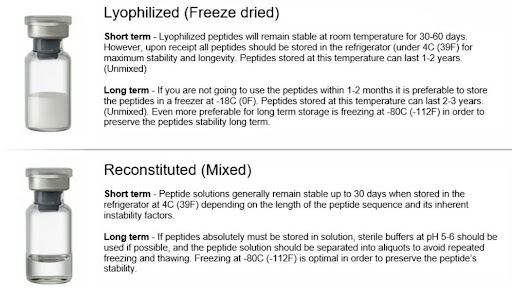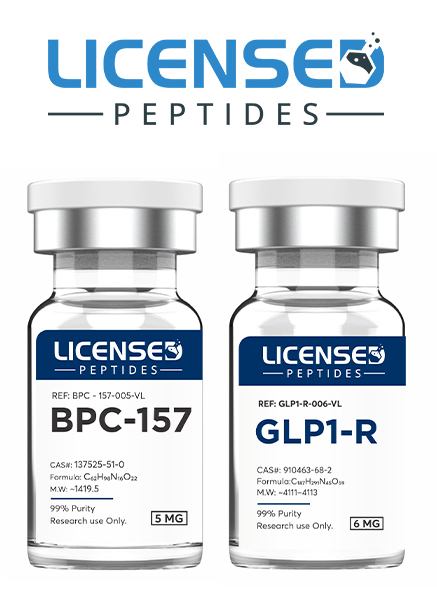How to Properly Store Peptides: Guidelines for Stability and Longevity
By Licensed Peptides | August 20th, 2025
Disclaimer: All articles and product details provided on this website are intended for educational and informational purposes only. The products listed here are for in-vitro research only. In-vitro studies are conducted outside of living organisms. These products are not intended as medicines or drugs and have not been approved by the FDA to prevent, treat, or cure any medical condition, ailment, or disease. The direct or indirect administration of these substances to humans or animals is unequivocally prohibited under applicable law.
Optimizing Peptide Preservation
The long-term stability of peptides is a cornerstone of reproducible and reliable research outcomes. Appropriate storage safeguards peptides against degradation, oxidation, and contamination, thereby preserving their structural and functional integrity. Although some sequences are inherently more labile than others, implementing rigorous storage protocols universally enhances peptide longevity.
Upon receipt, peptides should be stored under cold, light-protected conditions. Short-term storage (days to weeks) at 4°C (39°F) is typically sufficient. Lyophilized peptides are generally stable at ambient temperatures for several weeks, permitting near-term experimental use.
For extended storage (months to years), a deep freezer at −80°C (−112°F) is recommended, ensuring maximal structural preservation. Repeated freeze-thaw cycles must be avoided, as they accelerate molecular degradation. Additionally, frost-free freezers are suboptimal due to cyclical temperature fluctuations inherent to defrost cycles.

Mitigating Oxidation and Moisture Exposure
Peptides are highly susceptible to both oxidative and hydrolytic degradation. When retrieving a peptide from frozen storage, it should be equilibrated to room temperature prior to opening to prevent condensation on the peptide or container surface.
Minimizing exposure to oxygen is equally critical. Containers should remain sealed, and residual peptide can be safeguarded by resealing under a dry, inert gas atmosphere (e.g., nitrogen or argon). Sequences containing cysteine (C), methionine (M), or tryptophan (W) are particularly prone to oxidative modification.
To further reduce degradation risk, aliquoting peptides into experiment-specific portions is recommended, limiting the need for repeated freeze-thaw cycles and preserving the integrity of the remaining material.
Peptides in Solution: Considerations for Stability
Peptide solutions are inherently less stable than lyophilized forms and are vulnerable to microbial and chemical degradation. Sequences containing Cys, Met, Trp, Asp, Gln, or N-terminal Glu are particularly labile in solution.
When storage in solution is unavoidable, use sterile buffers at pH 5–6, and partition the solution into aliquots to minimize freeze-thaw cycles. Refrigerated solutions (4°C / 39°F) are generally stable for up to 30 days, whereas highly unstable peptides should remain frozen when not in immediate use.
Container Selection and Handling
Optimal storage containers must be chemically inert, structurally sound, and appropriately sized. Common materials include:
- High-quality glass vials: Chemically resistant, optically clear, and structurally robust.
- Plastic vials: Polystyrene offers clarity but limited chemical resistance, while polypropylene provides chemical robustness with translucency.
Peptides may be transferred between container types if necessary, ensuring that sterility and integrity are maintained throughout the process.
Comprehensive Storage Recommendations
To ensure maximal peptide stability and experimental reliability:
- Maintain storage in cold, dry, and dark conditions
- Minimize freeze-thaw cycles
- Limit exposure to oxygen and moisture
- Protect peptides from light
- Avoid long-term storage in solution
- Aliquot peptides according to experimental requirements
Stay Ahead of the Curve
Get exclusive updates on events, promotions, and special offers.
